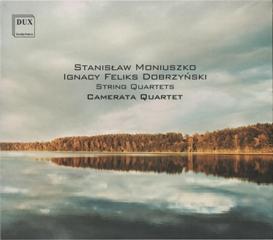Stanislaw Moniuszko, Ignacy Feliks Dobrzynski - String Quartets (2006)
Stanislaw Moniuszko, Ignacy Feliks Dobrzynski - String Quartets (2006)

01. String Quartet in E minor,Op. 7- Allegro Espressivo E Moderato [0:09:31.22] 02. String Quartet in E minor,Op. 7- Scherzo- Allegro Vivace, Ma Non Troppo Presto [0:06:40.60] 03. String Quartet in E minor,Op. 7- Adagio Molto Espressivo [0:07:56.63] 04. String Quartet in E minor,Op. 7- Finale- Presto [0:05:25.69] 05. String Quartet in F major- Allegro Moderato [0:08:28.44] 06. String Quartet in F major- Andante [0:04:30.27] 07. String Quartet in F major- Scherzo- Allegretto Baccanale Monacale [0:02:02.06] 08. String Quartet in F major- Finale- Allegro [0:02:17.49] 09. String quartet No 1 in D minor- Allegro Agitato [0:04:58.12] 10. String quartet No 1 in D minor- Andantino [0:03:44.04] 11. String quartet No 1 in D minor- Scherzo- Vivo [0:03:29.63] 12. String quartet No 1 in D minor- Finale- Allegro Assai -Un Ballo Campestre E Sue Consequenze [0:03:14.42] Camerata Quartet: Wlodzimierz Prominski – 1st violin Andrzej Kordykiewicz – 2nd violin Piotr Reichert – viola Roman Hoffmann - cello
This interesting disc from Dux surveys early Polish string quartets by two major figures in Polish music who were contemporaries of Chopin, Ignacy Feliks Dobrzynski, and Stanislaw Moniuszko. Moniuszko is best known through his operas and large sacred choral works; outside of the two string quartets played here by the Camerata Quartet, he produced almost nothing in terms of chamber music. Dobrzynski wrote four operas, of which Monbar, or the Freebooters (1838) was the work the composer considered his most important. However, in posterity it is through instrumental music that Dobrzynski is known -- his two symphonies, various pieces in concertante format, and numerous chamber and solo piano works have kept his name alive. Dobrzynski has three string quartets, of which this E minor work is the first, dating from 1827-1828; it has a lot of energy, but is rather dependent on the example of Haydn in both formal structure and thematic drive. It is a student work, and this is made obvious when Dobrzynski launches into a stodgy fugue or makes use of other predictable devices. The quartet has an attractive sound and is very lively, but it sounds like a quartet written about 1790 rather than one from around 1830. To Dobrzynski's defense, this is precisely what his audience -- and probably his teachers -- was expecting; even as Chopin was making his first bow, musical tastes in Poland were rather behind the times and would remain so for some time after he died.
The two Moniuszko quartets are far more engaging. The Scherzo "Bacchanale Monacale" from the String Quartet No. 2 in F still bears some traces of Haydn, but it is shot full of tricky modulations, sudden stops, and original ideas -- it is at least closer in style to the Mendelssohn current in Moniuszko's time, if not a bit more quirky. The String Quartet No. 1 in D minor is a very striking piece of music, contrasting flowing lyricism with more stubborn, dramatic figures that are vaguely reminiscent of Beethoven; it is even more advanced than the second quartet, demonstrating that Dux has the right idea in terms of sequencing the album. Admittedly, with the Andante of the second quartet boasting the lyric melody "Przasniczka," which Moniuszko reused in a vocal setting that became popular in Poland, the second quartet is more immediate than the first, whereas the first is more ambitious -- they round one another out quite well.
The playing of the Camerata Quartet in all three of these works is very dedicated, energetic, and exciting. This recording was made in Polish Radio studios in 1994-1995 and originally issued on the Ricercar label; its return to the catalog is certainly welcome. By June 2007, there were no other recording of Dobrzynski and the only alternative to the Moniuszko quartets was a Varsovia Quartet entry that has long disappeared. If one has an interest in nineteenth century Polish music, or just in spirited string quartet playing, then Camerata Quartet's Moniuszko/Dobrzynski: String Quartets will be well worth your time. --- Uncle Dave Lewis, Rovi
download: uploaded anonfiles yandex zalivalka solidfiles mediafire mega filecloudio
Last Updated (Tuesday, 29 October 2013 21:21)








